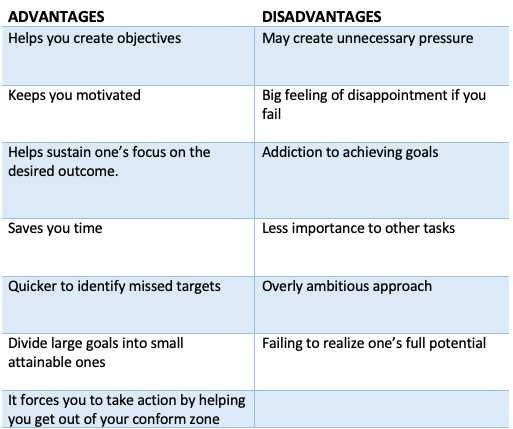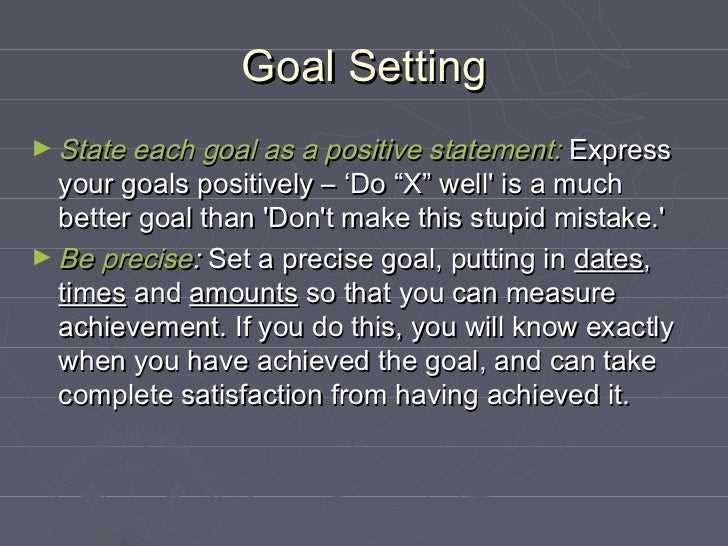Setting goals is an essential part of personal development. It gives us a sense of direction and purpose, and helps us stay focused on what we want to achieve. However, goal setting also has its disadvantages that can hinder our progress. It’s important to be aware of these challenges and find ways to overcome them.
One of the main disadvantages of goal setting is the pressure it can create. When we set specific targets and deadlines, we may start feeling overwhelmed and stressed if we’re unable to meet them. This can lead to a decline in motivation and even burnout. To overcome this challenge, it’s crucial to set realistic goals and break them down into smaller, manageable tasks. This way, we can avoid feeling overwhelmed and stay motivated.
Another disadvantage of goal setting is the potential for failure. Not every goal we set will be achieved, and experiencing setbacks can be demotivating. It’s important to remember that failure is a natural part of the process and should be seen as an opportunity to learn and grow. By embracing failure and using it as a stepping stone towards success, we can overcome this challenge and continue moving forward.
Unrealistic Expectations
One of the main challenges that individuals face when setting goals is having unrealistic expectations. Unrealistic expectations refer to setting goals that are too ambitious or difficult to achieve within a given timeframe. This can lead to frustration, disappointment, and ultimately, giving up on the goals altogether.
There are several reasons why people may develop unrealistic expectations when setting goals:
- Influenced by others: Sometimes, individuals set goals based on what they see others achieving or what society deems as successful. This can lead to setting unrealistic expectations as people may not take into account their own abilities, resources, and circumstances.
- Overestimating capabilities: Another reason for unrealistic expectations is overestimating one’s own capabilities. People may believe they are capable of achieving more than they actually are, leading to setting goals that are not realistically attainable.
- Ignoring potential obstacles: Unrealistic expectations can also arise from failing to consider potential obstacles or challenges that may hinder the progress towards the goal. When unexpected hurdles arise, individuals may become demotivated and give up on their goals.
To overcome the challenge of unrealistic expectations, it is important to:
- Evaluate and adjust: Take time to evaluate the feasibility and attainability of your goals. Consider your own abilities, resources, and circumstances. Adjust the goals if necessary to make them more realistic and achievable.
- Set smaller milestones: Breaking down your goals into smaller milestones can make them more manageable. Achieving smaller milestones along the way can help maintain motivation and keep you on track towards your larger goal.
- Develop a realistic timeline: Setting a realistic timeline for achieving your goals is crucial. Consider the amount of time and effort required for each milestone and adjust the timeline accordingly.
- Be flexible: It is important to be flexible and adaptable when faced with obstacles or challenges. Instead of giving up on the goal entirely, find alternative ways to overcome hurdles and adjust your approach.
By being aware of the potential for unrealistic expectations and taking proactive steps to address them, individuals can set more realistic goals and increase their chances of success.
Lack of Flexibility
One of the disadvantages of goal setting is the lack of flexibility. When you set specific goals, it can be challenging to adapt and change your plans when unexpected circumstances arise. This lack of flexibility can lead to frustration and a sense of failure when you are not able to achieve your original goals.
It is important to remember that life is unpredictable, and it is impossible to anticipate and plan for every possible obstacle or setback. However, there are strategies you can use to overcome the lack of flexibility and still achieve success:
- Stay open-minded: Instead of rigidly sticking to your original goals, be willing to adjust and adapt as needed. This might mean modifying your timeline or changing your approach to achieve the desired outcome.
- Be realistic: Set realistic expectations for yourself and your goals. Understand that there may be some factors beyond your control, and it is okay to revise your goals if necessary.
- Embrace change: View unexpected circumstances as opportunities for growth and learning. Instead of seeing them as setbacks, look for ways to use them to your advantage and adjust your goals accordingly.
- Seek support: Surround yourself with a network of supportive individuals who can offer guidance and advice when faced with challenges. Having a strong support system can help you navigate obstacles and find alternative solutions.
Remember, while setting specific goals is important, it is equally important to remain flexible and adaptable. By embracing change and being open-minded, you can overcome the lack of flexibility and continue to work towards achieving your goals.
Fear of Failure
One of the main disadvantages of goal setting is the fear of failure. Many people are afraid to set goals because they worry about not being able to achieve them. This fear of failure can be paralyzing and prevent individuals from taking risks and pursuing their dreams.
When individuals are afraid of failing, they may avoid setting goals altogether or set goals that are easily achievable. This can limit their personal and professional growth and prevent them from reaching their full potential.
Effects of Fear of Failure
- Procrastination: Fear of failure can lead to procrastination as individuals may avoid taking action on their goals out of fear of not succeeding.
- Lack of confidence: Fear of failure can erode an individual’s confidence and self-esteem, making it difficult for them to take risks and step out of their comfort zone.
- Stagnation: When individuals are afraid to set ambitious goals, they may become stagnant and settle for mediocrity instead of striving for excellence.
- Missed opportunities: Fear of failure can prevent individuals from seizing opportunities and taking bold steps towards achieving their goals.
Ways to Overcome Fear of Failure
Overcoming the fear of failure is essential for setting and achieving ambitious goals. Here are some tips to help overcome this fear:
- Change your mindset: Instead of viewing failure as something negative, reframe it as an opportunity to learn and grow. Embrace failure as a stepping stone towards success.
- Set realistic goals: Start by setting small, achievable goals that can build confidence and momentum. Gradually increase the difficulty of the goals as you gain more confidence.
- Develop a support system: Surround yourself with positive and supportive individuals who can encourage and motivate you to overcome your fear of failure.
- Take calculated risks: Rather than avoiding risks altogether, take calculated risks by evaluating the potential rewards and consequences. Break down big goals into smaller, manageable steps to make them less intimidating.
- Celebrate progress: Acknowledge and celebrate your progress along the way, regardless of the outcome. Each step towards your goals is a step forward, regardless of whether it leads to success or failure.
By acknowledging and addressing the fear of failure, individuals can overcome this disadvantage of goal setting and unlock their full potential for personal and professional growth.
Overwhelming Pressure
One of the biggest disadvantages of goal setting is the overwhelming pressure it can create. When you set specific goals for yourself, there is often a sense of urgency and expectation to achieve them within a certain timeframe. This pressure can cause stress, anxiety, and even burnout.
Here are some tips for overcoming the overwhelming pressure of goal setting:
- Break goals into smaller tasks: Instead of focusing on the end result, break your goals down into smaller, more manageable tasks. This will make them feel less intimidating and help you stay motivated.
- Set realistic deadlines: Be realistic about the time it will take to achieve your goals. Setting overly ambitious deadlines can contribute to feeling overwhelmed. Give yourself enough time to work towards your goals without rushing or stressing.
- Practice self-care: Take care of yourself physically, mentally, and emotionally. Make time for activities that help you relax and recharge. This can include things like exercise, meditation, spending time with loved ones, or pursuing hobbies.
- Ask for support: Don’t be afraid to ask for help or support from others. Whether it’s delegating tasks, seeking advice, or simply venting your frustrations, having a support system can make a big difference in managing the pressure of goal setting.
- Adjust goals if necessary: If you find that the pressure of a particular goal is becoming too overwhelming, it’s okay to adjust or modify it. Sometimes circumstances change, and it’s important to be flexible and adapt your goals accordingly.
Remember, goal setting should be a positive and motivating experience. While it’s natural to feel some pressure, it shouldn’t consume you to the point where it negatively impacts your well-being. By implementing these tips, you can overcome the overwhelming pressure of goal setting and find a healthy balance.
Loss of Focus
One of the disadvantages of goal setting is the potential loss of focus. When individuals set multiple goals at once, they may find it challenging to prioritize and stay focused on each one. This can lead to a lack of direction and productivity.
A loss of focus can also result from a lack of clarity in goals. If goals are not clearly defined or if they are too vague, individuals may struggle to stay focused and motivated. Without a clear target to work towards, it’s easy to get distracted or lose sight of the original purpose.
To overcome the loss of focus in goal setting, it’s important to:
- Prioritize goals: Identify the most important goals and focus on those first. This helps to avoid spreading oneself too thin and promotes a sense of direction.
- Break goals down: Instead of setting broad, overwhelming goals, break them down into smaller, more manageable tasks. This allows for better focus and progress.
- Create a plan: Develop a detailed plan for achieving each goal. This helps to provide structure and keeps individuals on track.
- Eliminate distractions: Identify and eliminate any distractions that may interfere with goal achievement. This could include setting boundaries with technology or creating a dedicated workspace.
In summary, the loss of focus is a common challenge in goal setting. However, by prioritizing goals, breaking them down, creating a plan, and eliminating distractions, individuals can overcome this challenge and maintain focus on their goals.
Lack of Motivation
Lack of motivation is a common challenge that many individuals face when it comes to goal setting. Without the drive and determination to pursue your goals, it can be difficult to stay focused and make progress.
There can be several reasons why one may lack motivation:
- Lack of interest: If you are not genuinely interested in the goal you have set, it can be challenging to find the motivation to work towards it. It is important to set goals that align with your passions and values.
- Overwhelm: Sometimes, the magnitude of the goal can feel overwhelming, leading to a lack of motivation. Breaking your goal into smaller, manageable tasks can help to overcome this feeling.
- Fear of failure: The fear of failure can often paralyze individuals, preventing them from taking action towards their goals. It is important to recognize that failure is a natural part of the learning process and can provide valuable lessons.
To overcome a lack of motivation, consider the following tips:
- Find your why: Reflect on why the goal is important to you and how achieving it will benefit you in the long run. Connecting with your deeper motivations can help reignite your drive.
- Break it down: Break your goal into smaller, more manageable tasks. By focusing on one step at a time, you can make progress and build momentum.
- Seek support: Surround yourself with individuals who inspire and motivate you. Sharing your goals with others can provide accountability and encouragement.
- Celebrate progress: Acknowledge and celebrate your progress, no matter how small. By doing so, you reinforce positive behavior and boost your motivation.
- Visualize success: Visualize yourself achieving your goal and experiencing the outcomes you desire. This can help strengthen your motivation and belief in your ability to succeed.
Remember, motivation can come and go, but it is essential to push through the moments of lackluster and keep striving towards your goals. With the right mindset and strategies, you can overcome the lack of motivation and achieve success.
Poor Time Management
Poor time management is a common challenge that can hinder the success of goal setting. When individuals struggle to effectively manage their time, it can lead to missed deadlines, increased stress, and a lack of progress towards achieving their goals.
Here are some common signs of poor time management:
- Frequently missing deadlines
- Procrastinating or leaving tasks until the last minute
- Constantly feeling rushed and overwhelmed
- Difficulty prioritizing tasks
- Being easily distracted and unable to stay focused
Poor time management can be overcome with the following tips:
- Set clear priorities: Determine which tasks are most important and focus on completing them first. Use tools such as to-do lists or task management apps to stay organized.
- Create a schedule: Allocate specific time slots for each task or goal, and stick to the schedule as much as possible. This helps create structure and ensure that time is dedicated to important activities.
- Avoid multitasking: While it may seem efficient, multitasking often leads to decreased productivity and increased errors. Instead, focus on one task at a time and give it your full attention.
- Eliminate distractions: Identify and minimize distractions that steal your time and attention. This could include turning off social media notifications, closing unnecessary browser tabs, or finding a quiet workspace.
- Delegate or outsource: If possible, delegate tasks to others or outsource certain responsibilities. This can help free up time for more important or high-priority tasks.
Taking steps to improve time management skills will not only help individuals overcome the challenges associated with poor time management but also increase their chances of achieving their goals successfully.
Lack of Accountability
One of the major challenges of goal setting is the lack of accountability. When you set goals for yourself, there is no external force holding you accountable for achieving them. This lack of accountability can often lead to procrastination, inconsistency, and ultimately, failure to reach your goals.
Without someone to hold you accountable, it’s easy to make excuses and put off taking action towards your goals. You might find yourself saying things like “I’ll start tomorrow” or “I don’t have enough time right now.” These excuses can quickly derail your progress and prevent you from making any real progress.
To overcome the lack of accountability, it’s important to establish a system of self-accountability. Here are a few tips to help you stay on track:
- Set specific deadlines: Instead of setting vague goals with no timeline, set specific deadlines for each step of the goal-setting process. This will create a sense of urgency and help you stay focused.
- Create a schedule: Develop a daily or weekly schedule that includes dedicated time for working towards your goals. Treat this time as non-negotiable and stick to it consistently.
- Find an accountability partner: If you struggle with self-accountability, consider finding an accountability partner. This can be a friend, family member, or mentor who can provide support, motivation, and guidance along your goal-setting journey.
- Track your progress: Keep a record of your progress towards your goals. This could be in the form of a journal, spreadsheet, or app. Regularly reviewing your progress will help you stay motivated and keep your eye on the prize.
By implementing these strategies, you can overcome the lack of accountability often associated with goal setting. Remember, achieving your goals requires discipline and consistency, even when no one else is watching.
Questions and answers
What are the disadvantages of goal setting?
While goal setting can be beneficial, it also has its disadvantages. Some of these include setting unrealistic goals, experiencing burnout, and becoming too focused on the end result rather than the process.
How can I overcome setting unrealistic goals?
To overcome setting unrealistic goals, it is important to set goals that are specific, measurable, attainable, relevant, and time-bound (SMART goals). It is also helpful to break down bigger goals into smaller, more achievable steps, and seek feedback from others to ensure the goals are realistic.
What is burnout and how can it be prevented?
Burnout is a state of emotional, physical, and mental exhaustion caused by excessive and prolonged stress. It can be prevented by setting realistic goals, prioritizing self-care and rest, practicing stress management techniques, and seeking support from others.
How can I stay focused on the process rather than the end result?
To stay focused on the process rather than the end result, it can be helpful to break down goals into smaller tasks and focus on completing each task to the best of your ability. Additionally, practicing mindfulness and staying present in the moment can help shift the focus away from the end result.
What are some tips for overcoming challenges in goal setting?
Some tips for overcoming challenges in goal setting include setting realistic goals, tracking progress, adjusting goals if necessary, seeking support from others, staying resilient in the face of setbacks, and celebrating small achievements along the way.


